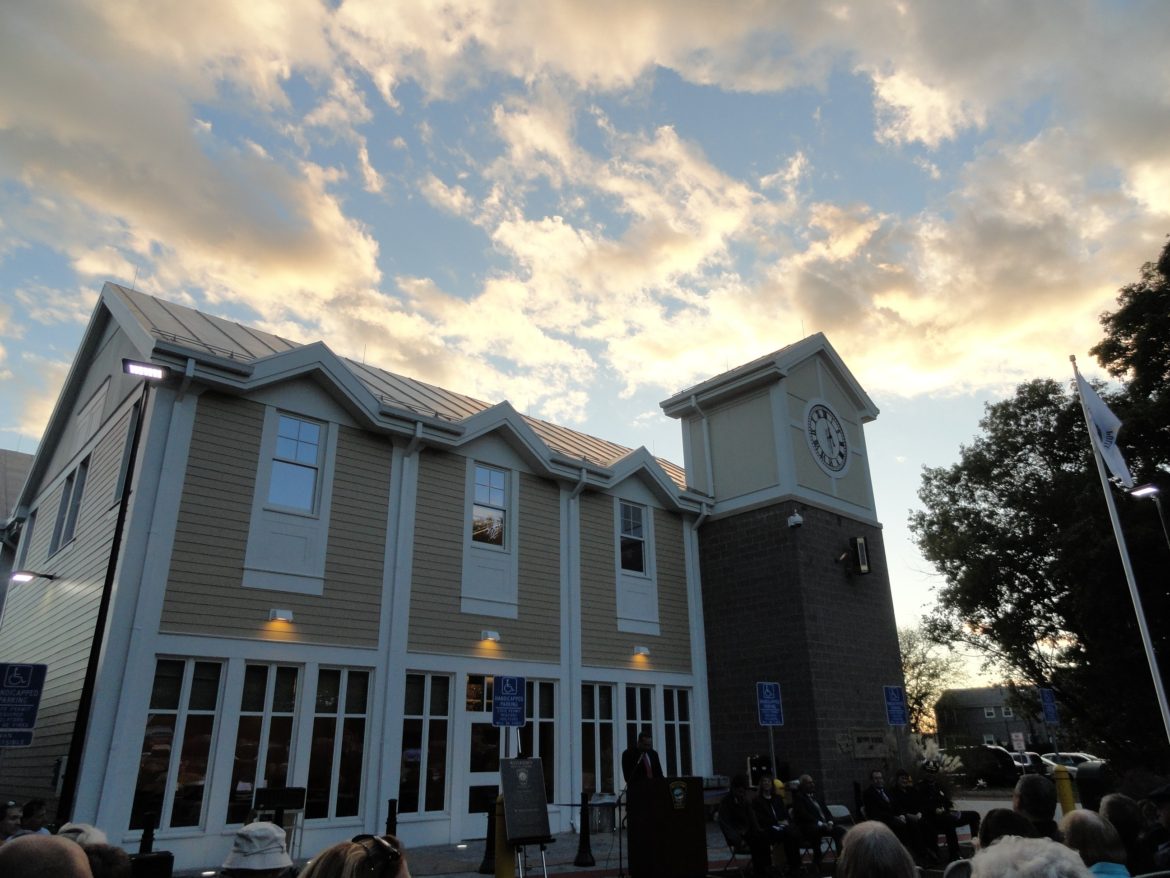
Charlie Breitrose
Watertown Police Station
By Ruth Thomasian
“Understanding through Education.” That’s how Chief Michael Lawn announced the reintroduction of the Watertown Police Department’s Citizen Police Academy in the fall of 2016.
Two decades ago Watertown’s first Citizen Police Academy began, and ran from 1996-2008, with Capt. Ray Dupuis as its Director. Well over 200 Watertown citizens enrolled in those 10-week classes, held in the old police station’s makeshift classroom. It was entirely funded with federal grants. Students gave it rave reviews, but when funding ended, so did the Academy.
This time the Academy, with a total of eight 3-hour evening classes, was held in the community room of our new police station. And, with no federal funds available for community police outreach, this Academy was totally funded through the Watertown Police Department’s own budget and the generosity of participating officers who voluntarily accepted comp time in lieu of over-time pay. Chief Lawn expects to continue this funding practice for the second Academy this coming fall.
Many of the 22 students in this October-December 2016 class were young and new to Watertown in the last decade. And many students, myself included, were graduates of the previous Academy. Now, as seniors, we were looking to continue our education and understand what has remained the same and what is new with our police. At each class we were all warmly welcomed by both Chief Lawn and Capt. Dupuis, who continues as the Academy’s Director. Capt. Dupuis, during his recent tenure as Acting Chief, had begun the rebirth of the Academy earlier in 2016 when he successfully presented one stand-alone Academy class held at Watertown High School.
Each member of this new class was presented with a workbook explaining the curriculum. Each class featured one or two police officers and other personnel, teaching their specialty in the form of lectures, tours, demonstrations, and hands-on practice. Students were always encouraged to ask questions, and we did. The classes were all about relationship building, and in those 8 weeks, that is exactly what both students and teachers experienced.
Part of the first class included a fascinating tour of the three floors of the Police Station, in two groups led by the Chief and Captain. We walked the hallways and were impressed with the physical facility. We looked in on the shooting range – during a later class, students were able to train on the gun simulator. We viewed both the exercise room where staff stays in shape; and were awed by the details of the crime lab – during another class we got a “tour” of the crime lab for a better understanding of all that goes into investigating crimes. We walked by the door to the evidence room and were told that only one person at the station has the key – a safety measure to protect the integrity of the evidence. We also saw the jail with its cement beds, and the car maintenance garage. The night public-safety dispatcher gave us a detailed description of the types of calls they receive—both police and fire emergencies, and how they handle them. We were all spellbound by the depth of life experiences dispatchers deal with every single day.
One class was devoted to the legal aspects of policing, everything from following proper procedures to restrictions on what police can do including probable cause and reasonable suspicion. It became obvious to us that our police need to know the law – understanding through education. We also received instruction from officers in the administrative services bureau, the traffic and detective divisions, and community and staff development. And, the Chief and Captain gave us the chilling account of exactly what happened in Watertown after the Marathon bombing and the little known Watertown connections of the Tsarnaev brothers. Outside of class students had the option to do a “ride-along” in a police car for several hours of patrol duty.
What did I, as a repeat class attendee, learn that was new to me? Well, several things come to mind. One is the functionality of our police station. The building itself serves so well both police business and community outreach, as we students experienced during classes. The outdoor property, the former Brown School yard, in the summer is the site of Friday movie nights with popcorn and ice cream for kids of all ages; and in the winter the parking lot serves as off-street parking for neighborhood residents. The other amazing realization was the education level of our police officers. Most of our police have college degrees in criminal justice, and all at the managerial level have masters degrees in criminal justice—just as the Academy slogan says: Understanding through Education.
For me, and I dare say, my classmates as well, our Academy classes confirmed the importance of police and community members working together to develop lasting, meaningful relationships. I feel proud that my police department is so invested in its community, which is theirs also, since most officers live in Watertown. I applaud Chief Lawn for his creative use of resources and the enthusiasm of his officers in their outreach to citizens. Captain Dupuis gets thumbs up for his diligence in reaching out to officers to participate and create relationships with those they serve. Wouldn’t we like to see all communities across our nation do the same for their citizens and police?
Stay tuned for the announcement of the fall 2017 class.
dear author, I’m just wondering if you asked your usual question about what can be done with the [illegal] immigrants. or this was not en vogue at that time……..
Hi, I am not sure of you saw this story but it may address your question. http://www.watertownmanews.com/2017/01/26/police-chief-says-watertown-will-not-seek-out-immigration-status/
Hi Ruth,
Thanks for giving us all an informative view of the Citizens Police Academy.
This will encourage others to seek the experience, all of which will improve the good relationship between the Police and the community that we already exists.
Also, thanks to Chief Lawn and Capt Dupuis.
John